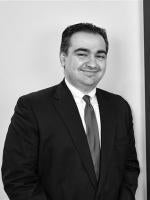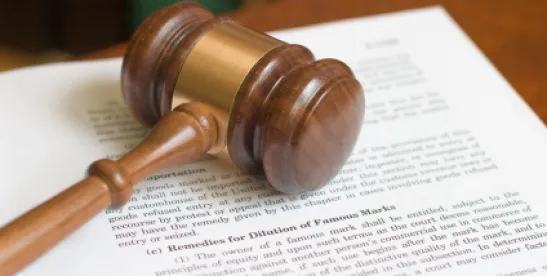The Supreme Court recently agreed to hear a challenge to the current interpretation of the venue statute in patent infringement cases. As the Federal Circuit currently interprets the patent venue statute, a plaintiff may sue in any district where the defendant is subject to personal jurisdiction, which for many corporations means virtually any venue in the land. In its petition to the Supreme Court, TC Heartland LLC argues that this broad range of venue choices available to plaintiffs has spurred “venue shopping” in patent cases.
Venue shopping has concentrated patent infringement litigation in a few “plaintiff-friendly” districts. In 2015, almost 65 percent of patent cases were filed in just five district courts.[1] The Eastern District of Texas was the most preferred venue, accounting for more than 40 percent of patent cases filed.
TC Heartland urges a narrower interpretation of the venue statute—e.g., where the defendant is incorporated. It argues that a narrower interpretation would limit a plaintiff’s venue choices, disperse patent cases more widely throughout the federal courts system, and reduce forum shopping.
The Journey of TC Heartland to the Supreme Court: Procedural History
Kraft Food Groups Brand LLC sued TC Heartland in the District of Delaware alleging infringement of three patents related to liquid water enhancer products. TC Heartland asserted that it is not registered to do business in Delaware and has no contracts to do business in the state; TC Heartland is an LLC organized under Indiana law and is headquartered in Indiana. TC Heartland, therefore, moved to transfer venue to the Southern District of Indiana. Kraft opposed.
The parties’ dispute falls at the intersection of two venue statutes. The first is 28 U.S.C. § 1391, a general venue provision that broadly defines “residency” as “any judicial district in which such defendant is subject to the court’s personal jurisdiction.” The second statute is 28 U.S.C. § 1400, which is the specific provision governing venue in patent infringement cases. It limits venue to a district “where the defendant resides” or “where the defendant has committed acts of infringement and has a regular and established place of business.”
TC Heartland argued that the term “resides” in Section 1400(b) should be interpreted to limit venue to a corporate defendant’s state of incorporation (here, the Southern District of Indiana). The Federal Circuit, however, has previously held that Section 1391(c)’s definition of residency applies to Section 1400(b)’s term “resides,” and therefore, a patent-asserting plaintiff can sue in any district where the defendant is subject to personal jurisdiction.[2] After the district court and the Federal Circuit rejected its arguments, TC Heartland petitioned the Supreme Court. The Court granted certiorari on December 14, 2016.
The Parties’ Positions
TC Heartland’s argument focuses on Section 1400(b), which states that a party asserting patent infringement may sue in any district “where the defendant resides, or where the defendant has committed acts of infringement and has a regular and established place of business.” TC Heartland relies on the 1957 case FourCo Glass Co. v. Transmirra Profs. Corp., in which the Supreme Court interpreted the phrase “where the defendant resides” to mean, for a corporate defendant, “the state of incorporation.”[3] The Supreme Court also held in FourCo that Section 1400(b) is the “sole and exclusive” provision determining venue in patent infringement actions and that this provision is unaffected by the definition of “residence” in Section 1391(c).[4]
On the other hand, Kraft focuses on the 1988 amendment to Section 1391(c). Kraft argues that this amendment superseded FourCo because the amendment added the phrase “for purposes of venue under this chapter.” (emphasis added). Because “this chapter” includes Section 1400, Kraft argues that the broad definition of residency of the amended Section 1391(c) embraces “resides” in Section 1400(b). TC Heartland counters that there is no express evidence either in the statutory text or in the legislative history that Congress intended to change Section 1400(b) by the 1988 amendment to Section 1391(c).
The 2011 amendment to Section 1391 added even more wrinkles: It removed the phrase “[f]or purposes of venue under this chapter,” and added the limitation that Section 1391(a) applies “except as otherwise provided by law.” TC Heartland argues that Section 1400(b) is the “law” that “otherwise provide[s]” and, thus, Section 1391 did not apply in patent litigation. To support this argument, TC Heartland points to a 2013 Supreme Court decision stating that Section 1391 governed “venue generally” in cases where more specific provisions, such as Section 1400 for copyright and patent cases, do not apply.[5]
Kraft, not surprisingly, challenges this interpretation of the 2011 amendment. Kraft counters that the 2011 amendment did not change the interpretation of Section 1400(b) for two reasons: First, FourCo’s interpretation of Section 1400(b) is not the other “law” to which Section 1391(a) makes an exception; and second, the 2011 amendment actually broadened the definition of “residency” by replacing the phrase “[f]or purposes of venue under this chapter” with “[f]or all venue purposes.” (emphasis added).
What’s Next if the Supreme Court Ends Venue Shopping?
A Supreme Court ruling in TC Heartland’s favor would change the venue map of future patent infringement actions and considerably limit venue choices for a patent-asserting plaintiff. Plaintiffs could be limited in their choice of venue to the district where the defendant is incorporated (or perhaps a somewhat broader choice) and would no longer be free to choose any district where there is personal jurisdiction over the defendant. This change could dramatically reduce the number of cases in “hotbed” districts for patent litigation, such as the Eastern District of Texas.
A recent Supreme Court action may provide additional insight: Since agreeing to hear the TC Heartland case, the Court declined to hear an appeal of a Hatch-Waxman litigation finding that a non-resident generic pharmaceutical company was subject to personal jurisdiction in the District of Delaware.[6] In the case, the Federal Circuit determined that the District of Delaware had personal jurisdiction over the generic because the generic’s filing of an abbreviated new drug application (ANDA) indicated its intention to market its product in Delaware. Without providing any comment, the Supreme Court declined to hear the generic drug company’s appeal of the Federal Circuit’s opinion. However, a decision in TC Heartland’s favor that results in a narrow interpretation of venue law would likely limit the number of courts that are considered appropriate to bring future patent cases (including Hatch-Waxman litigation).
[1] Brian Howard, Lex Machina 2015 End-of-Year Trends Fig. 3 (Jan. 7, 2016), available at http://www.lexmachina.com/lex-machina-2015-end-of-year-trends.
[2] VE Holding Corp. v. Johnson Gas Appliance Co., 917 F.2d 1574, 1578 (Fed. Cir. 1990).
[3] 353 U.S. 222, 226 (1957).
[4] Id. at 229.
[5] Atlantic Marine Construction Co. v. United States Dist. Court for the Western District of Texas, 134 S. Ct. 568, 577 n.2 (2013).
[6] Mylan Pharmaceuticals Inc. v. Acorda Therapeutics Inc., Docket No. 16-360 (petition denied Jan. 9, 2017).



 />i
/>i
